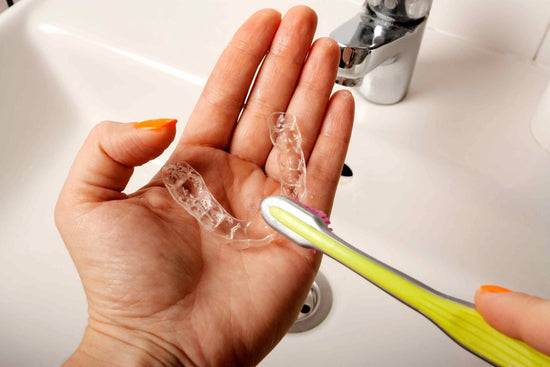Maintaining good oral hygiene is essential for your overall health, and that includes properly caring for your night guard or retainer. These devices play a crucial role in protecting your teeth, but they can quickly become breeding grounds for bacteria if not cleaned regularly. In this blog post, we'll explore the importance of cleaning your night guard or retainer, as well as provide practical tips and techniques to keep them in top shape.
Why Cleaning Matters
Your night guard or retainer is designed to protect your teeth, but it can also harbor a surprising amount of bacteria, plaque, and other debris if not cleaned properly. This buildup can lead to a variety of issues, including bad breath, gum irritation, and even an increased risk of tooth decay or other oral health problems.
Regular cleaning not only helps to prevent these issues but also extends the lifespan of your device. By keeping it clean and well-maintained, you can ensure that it continues to provide the protection and support your teeth need, whether you're wearing it at night or during the day.
Daily Cleaning Methods
The key to keeping your night guard or retainer clean is to establish a consistent cleaning routine. Here are some simple steps you can follow:
-
Rinse after use: As soon as you remove your device, give it a thorough rinse under cool, running water. This helps to remove any immediate buildup of saliva, food particles, or other debris.
-
Gentle brushing: Use a soft-bristled toothbrush and a small amount of mild, non-abrasive soap or denture cleaner to gently scrub the surface of your device. Be sure to pay attention to any nooks or crannies where bacteria can accumulate.
-
Recommended cleaning solutions: For an extra boost of cleaning power, you can soak your night guard or retainer in a diluted solution of white vinegar or a specialized cleaning solution designed for dental appliances.
Deep Cleaning Techniques
While daily cleaning is essential, it's also important to perform a more thorough, deep cleaning on a weekly basis. Here's how to do it:
-
Soak in cleaning solution: Fill a small container with a mixture of warm water and a denture cleaner or a diluted solution of white vinegar. Submerge your night guard or retainer and let it soak for 15-20 minutes.
-
Gentle scrubbing: After the soak, use a soft-bristled toothbrush to gently scrub the surface of the device, paying extra attention to any areas that seem particularly dirty or discolored.
-
Rinse thoroughly: Make sure to rinse your night guard or retainer thoroughly under cool, running water to remove any remaining cleaning solution or debris.
Common Mistakes to Avoid
When it comes to cleaning your night guard or retainer, there are a few common mistakes you'll want to steer clear of:
-
Avoid hot water: Never use hot water to clean your device, as this can cause it to warp or become misshapen.
-
Steer clear of harsh chemicals: Avoid using harsh chemicals, such as bleach or abrasive cleaners, as these can damage the material and compromise the integrity of your night guard or retainer.
-
Proper storage: When not in use, be sure to store your night guard or retainer in a clean, dry place, such as a protective case or container.
Storage Tips
Proper storage is just as important as regular cleaning when it comes to maintaining your night guard or retainer. Here are some tips to keep in mind:
-
Drying techniques: After cleaning, make sure to thoroughly dry your device before storing it. You can use a clean, soft cloth or paper towel to gently pat it dry.
-
Ideal storage conditions: Store your night guard or retainer in a cool, dry place, away from direct sunlight or heat sources. A protective case or container can help to keep it clean and safe.
-
Protective cases: Consider investing in a dedicated storage case or container designed specifically for your night guard or retainer. This can help to protect it from damage and keep it clean between uses.
When to Replace
Even with proper care and maintenance, your night guard or retainer will eventually need to be replaced. Here are some signs that it's time to get a new one:
-
Visible wear and tear: Look for signs of cracking, warping, or discoloration, as these can indicate that the device is no longer functioning as it should.
-
Recommended replacement frequency: Follow the guidance of your dental professional, as they can provide recommendations on how often you should replace your night guard or retainer based on your individual needs and usage.
-
Impact on oral health: If you notice any changes in your oral health, such as increased tooth sensitivity or gum irritation, it may be a sign that your night guard or retainer is no longer providing the necessary protection and support.
By following these tips and techniques, you can keep your night guard or retainer clean, well-maintained, and functioning at its best. Remember, taking care of your oral health is an ongoing process, and proper care of your dental devices is an essential part of that. So, make cleaning your night guard or retainer a regular part of your oral hygiene routine, and enjoy the benefits of a healthy, happy smile.





